You don’t see the pressure in the phone calls. You don’t hear the quiet conversations with families who just want the best for their child. But that’s where Ohi Longe lives, in the connections that hold football together. For seven years, the UK-based agent has been guiding young players through one of the toughest industries in the world.
It isn’t glamour that drives him. It’s trust. From first trials at Charlton or Barnsley, to negotiations with clubs like Tottenham, Everton, Derby and Ipswich, Ohi has worked with more than 20 players across the English system. Players from different backgrounds, cultures, and stories, each facing the unique challenges of trying to break through in a game that can be brutally cold.
Once an aspiring player himself, Ohi knows the emotional weight of the journey. And that’s why his mission goes beyond deals and contracts. He wants to protect young talent from the pitfalls, champion African and minority players who are often overlooked, and give honest advice to the next generation of agents and players alike. In a sport obsessed with the top flight, Ohi is proving that real influence isn’t found in the spotlight, it’s in the relationships built behind it.
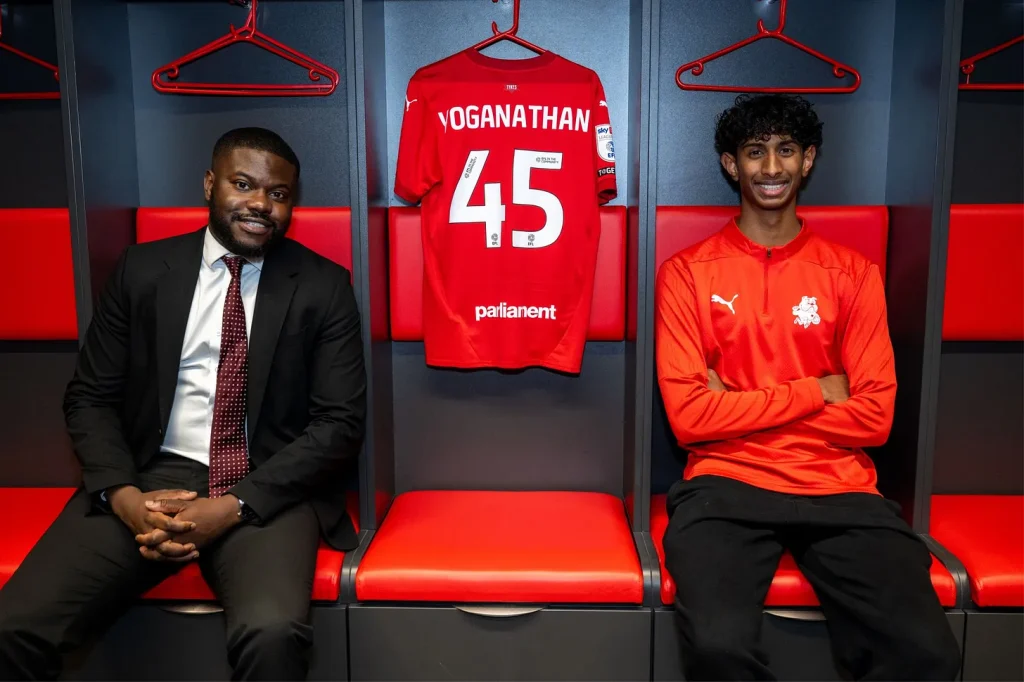
Pleasure to have you here, Ohi. Let’s start with your own career. Tell us about your journey in football before becoming an agent?
Ohi:
For many years, I was chasing a professional football career, as you know. The older I got, I started to consider other options as well. Obviously, the transition post-university was hard for a while; I was focusing on just semi-professional football. But as I started to get older, there were bills to pay, so I had to start to consider other options within the game.
A couple of people started to mention agency to me. I started to do a bit of research into agency and what that could look like. And then, yeah, one day after work when I was working a 9-5 at a bank.. I would work all day, from 8am to 6pm in a bank, and then I’d have to get the train to play semi-professional football for Clapton FC. And one day, really tired from work, I was actually supposed to go on a trial with a team in the league above called Northward. And I just thought to myself, the reason why I got into this was to try and play at the highest level possible. If I’m being realistic with myself, sitting down nine-to-five all day, not moving around a lot, eating, I was putting on weight. So even if I did go for the trial and I did get in, what’s the likelihood of me being able to get my head down and focus on football and be able to train as hard as I need to every day to reach the heights I wanted to? So I just decided that evening not to go to the trial and to start to look into the agency side of things properly. I was 24 years old at the time. What’s the honest chance of me making it to the Premier League? Very unlikely. So I had to be quite honest with myself.
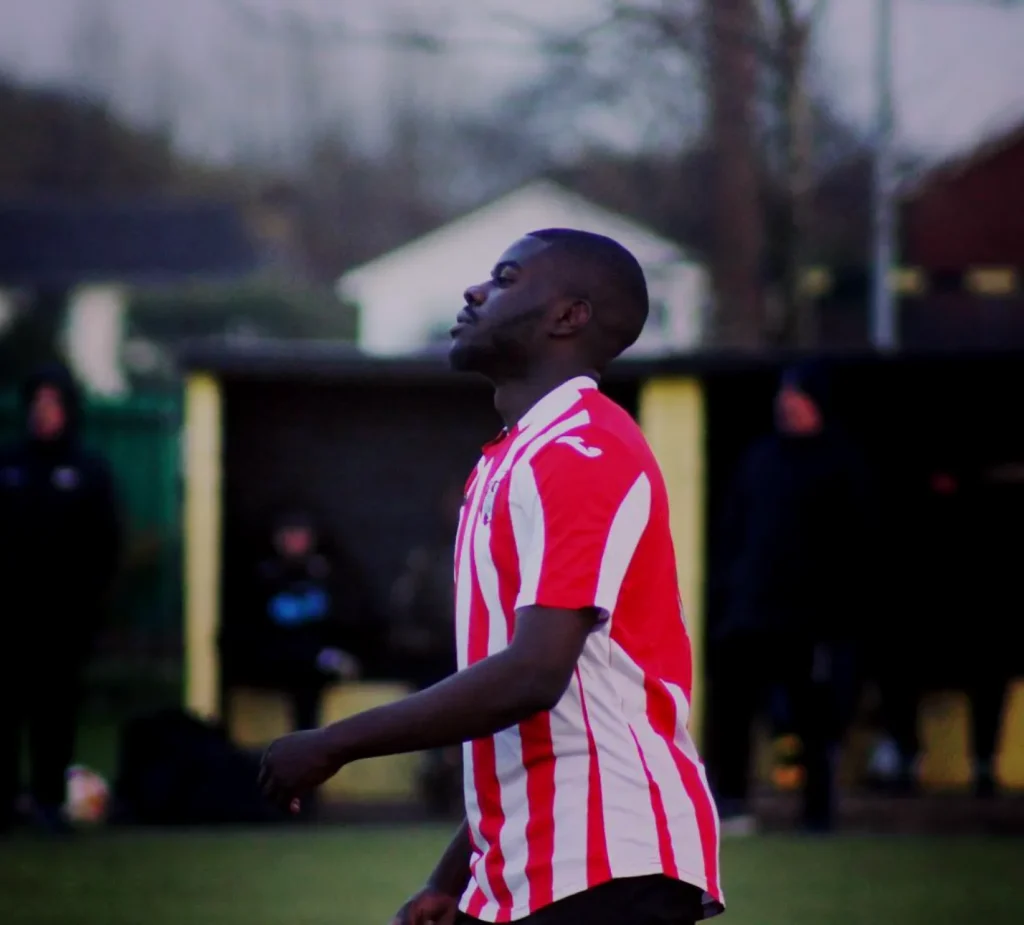
That sounds like a conversation that many of young people need to have with themselves. Did you feel any sort of heartbreak? How was that?
Ohi:
I think that heartbreak came many years before, in the sense that I had tried to actually quit playing. At the time, my uncle, Mr Seyi Akinwunmi, was the Vice President at the Nigerian Football Federation. So whilst I was at Loughborough University, he arranged for me to go on trial with the Nigerian under-23 team. After a full year of university, I went to camp with players like Wilfred Ndidi, Viv Solomon, and quite a few other notable names. And the level there was just… I think that was when I knew I wasn’t going to make it or reach the heights I wanted to. We were playing games in training and it was just a bit too fast, a bit too intense for the level I was at. That was the start of the journey where I began to think, “You know what? This might not be the path that I’ll pursue,” because I wasn’t at the level I needed to be. These players were full-time, playing for some of the biggest clubs in England, Spain, or Portugal, and I was at university trying to keep up with them. It wasn’t going to work.
It sounds like as a young man trying to navigate the game, there are a lot of challenges that you would face. Now that you’re older and you’re an agent, how do you see these challenges for younger players? and what do you think are the main challenges that young players are facing currently?
Ohi:
The first thing I’ll say is there are just a lot of people trying to make it. I’m not sure a lot of people realise just how tough the football industry is and how competitive it really is. One thing I’ve noticed since I became an agent and stopped playing is that it’s extremely tough. You need to be bettering yourself, improving and working on your game every day, basically being obsessed with football, just to stand a chance. And that’s just a chance, not even making it. To stand a chance, you basically need to lock into football, to have no friends more or less. Go to training, rest. Go to training, rest. Go to training, rest. Even to have a chance, you can’t have a social life or think you can commit to football anything less than 150%. I’m not sure people realise how competitive the market is. Even good players within the system find it hard to get moves and to change clubs. So for players outside the system, imagine how hard it is for them.
That’s something I think a lot of young players need to understand: the dedication required to make it.
And then there’s the business side of things as well. I always say to some of my colleagues that it would help players so much if they understood how the market works, both from their point of view and from their agent’s point of view. Because if a club is telling me that a player is not at the level or not the right fit for them, if I were a player I’d want to understand what the right fit was so I could then add it to my locker to give me a better chance.
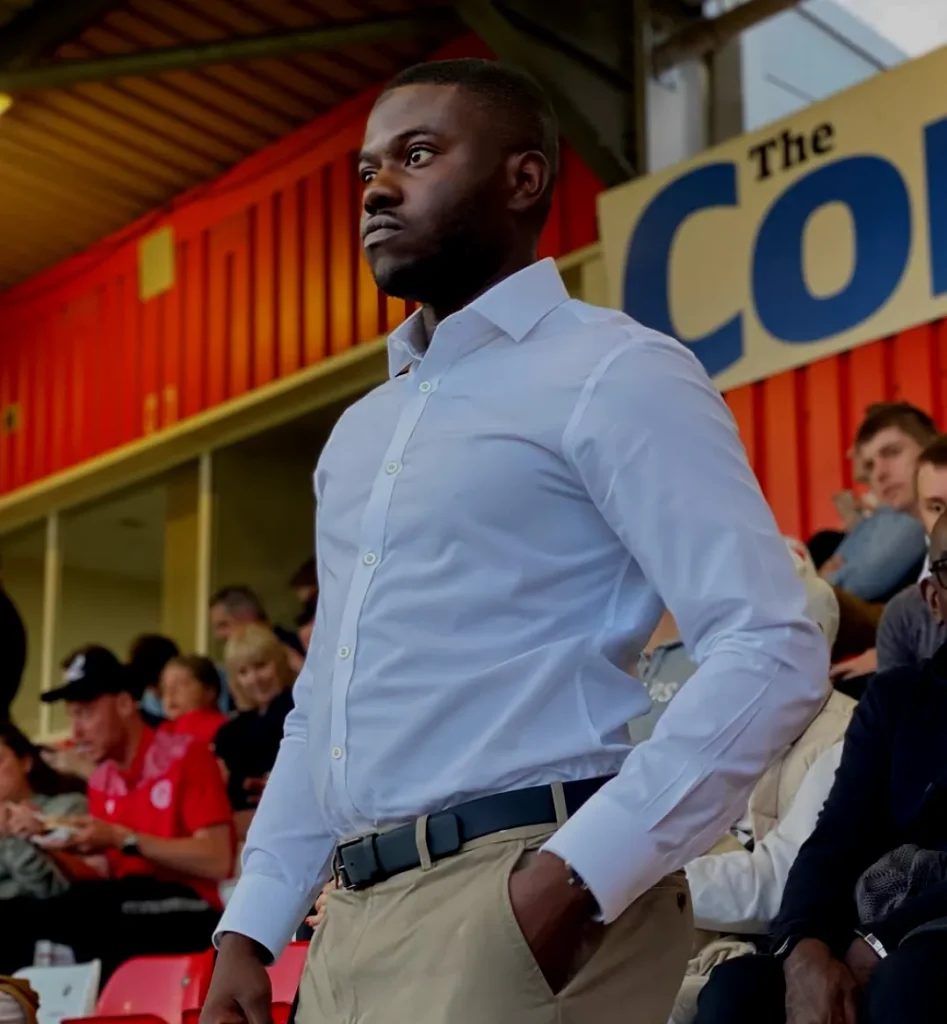
When you say they need to understand the fit in terms of the business side of things, do you mean understanding the club’s wages and structure, how much they’ll get paid and whether they can be moved based on that, or is it more about what the club’s requirements are in that window?
Ohi:
For example, a club might be looking for a centre forward of a certain height or profile. If I were a player, I’d try to understand exactly what the club is looking for, the language they use, why they might choose another target over me. It’s not just about transfer or salary requirements.
It’s more about which players consistently appeal to clubs and why they might pass on me. Understanding that, I think, helps players a lot.
That makes sense. A young player might think, “I’m skilled, fast, and I score goals,” only to find they’re not what the team needs. It can be crushing, but it’s not a reflection of their ability, it’s just about fit.
Ohi:
100% it’s not really about you. Yes, you might score goals. You might have had a great season. You might have done really well, but here’s other things that the clubs are after. There’s other things the clubs are looking at. So yes, you’ve done really well, but it’s not all about you. There’s a market out there. There’s a huge pool of players available on the market. So getting an understanding of this, I think, will really help young players.
That makes a lot of sense, and this question touches on that a bit, because it’s a very complex landscape for young players. I guess we can also say it’s complex for an agent like yourself, who’s been in the game for some time. You’ve been a player, and even you still find it complex. So, I want to know, how do you support these young players? What measures do you take?
Ohi:
I’m very thorough in my job. I’m very thorough in what I do. This is my dream job. It is work, it does get tiring, it does get depressing, like every job, but I love it, and I wouldn’t want to do anything else. So I’m very thorough with what I do. I’m very honest with my clients, in the sense that I give them the information I believe they need to hear. I’m there for them every day because I understand how competitive the industry is. So in terms of support and information, I’m always giving my clients the information I believe they need to thrive in the industry. I’m very active. I’m aware of what every club is after. I’m aware of what clubs are looking for. I’m always thinking about ways to create new opportunities for my clients, to grow their profiles, and to push them.
I’m very active on social media, always on the phone to clubs to understand what they’re after, to sell my clients, even when I know they’re not what they’re after, because putting the player on the club’s radar is never a bad thing. So even if a club is not looking for a left centre back, for example, this is my client. He’s a left centre back at this club, just keep an eye on him. Make sure they’re aware of him. There are thousands of agents reaching out to clubs every day. So the way I see it is: the more you reach out to these clubs, the more you push your clients, the better chance you give them. I’m the type of agent that reaches out to a club to buy a player, and even if they don’t reply, I copy the exact message and send it again. I copy the exact message and send it again and again. And I’ve found that when you do that a number of times, the person, the head of recruitment, the sporting director, then responds because he’s like, “Oh, this guy is really trying to get across to me.” A lot of agents, or a lot of people within the game, from my experiences, I don’t think have that persistence or resilience. I’ve heard a couple of agents say, ‘he didn’t respond to me, he’s getting messages from a thousand people.’ He’s not going to respond to you unless you show that resilience. Message him a number of times, or you push the agenda till you get a response. So these are the things I do to give the boys and girls a strong chance.
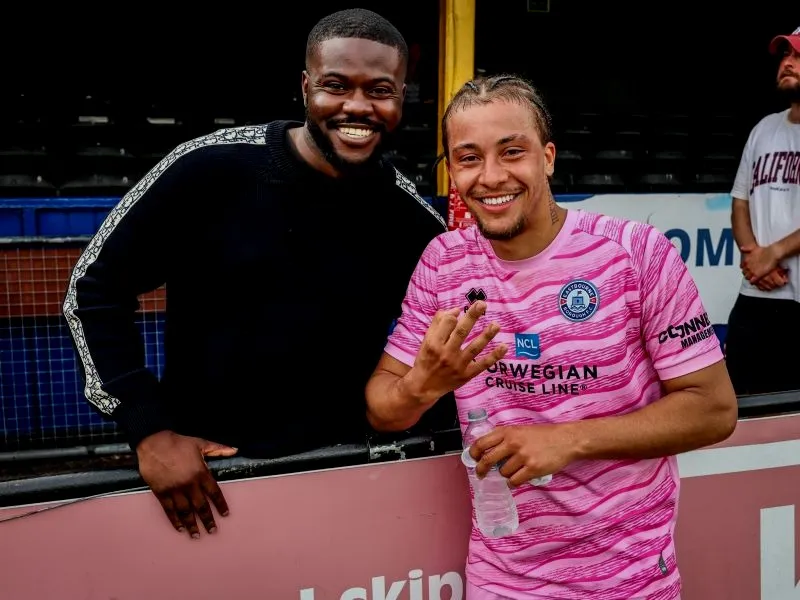
That’s great insight because from the outside looking in, you just think about being the best footballer you can be, and think that’s enough to get you noticed. But you’re making it clear that it’s more than scouts deciding on their own to come and watch you play. Your agent has to put you in front of the scouts sometimes.
What ways do you help raise a players profile ?
Ohi:
With young players, the way it works is: as a 16-year-old, you sign a scholarship at a club, and you’re at the club for two years as a scholar. After that, you’re then supposed to sign a pro contract if you progress. So within the first two years of your scholarship, I think it’s very important to start growing their profiles. As I mentioned, I use social media a lot, and it has really worked for me over the past seven years in football. I’m very active on all platforms: X (formerly Twitter), Instagram, LinkedIn, and TikTok these days. I’m sharing clips of my players, their goals, their play, information about them, and just using the internet. I also work closely with some journalists I trust to start creating a picture of the player and who they’re likely to become as they grow older. So I mainly use social media and word of mouth too. As I said, I’m constantly on the phone with clubs to make them aware of the players.
So is there a world where the highlights you post can make a club aware of a player?
Ohi:
The club has likely already seen the player. On my socials, for example, I follow heads of recruitment at different clubs. By posting about my 16-year-old clients who have just signed a scholarship, the head of recruitment at, let’s say, QPR, would have seen it. He might not have studied it in detail, but he would have noticed it. So if the player does something else and pops up again, it becomes: “I’ve seen this player somewhere before.”
You’re building a brand name around players from as early as possible.
Ohi:
100%
You’ve spoken about how involved you need to be and how you need to be there for your players. It’s also clear from your socials that, as well as attending many games, you’re at training sessions and spend time with players off the pitch. How important do you think that actual, in-person presence of an agent is?
Ohi:
It’s very important. What I’ve found is, and this isn’t the case in every situation, but in most, players who do better are the ones with strong family support. Football is a high-pressure environment with high stakes. Players thrive when they know someone is in the crowd supporting them.
I’ve seen firsthand a player competing at a high level in one of the top five leagues struggle on the pitch due to a lack of off-pitch support. That physical presence, someone there to talk to after the game is crucial. Your teammates have their families waiting for them in the lounge, and if you come off the pitch without anyone to talk to, it can make you overthink and process things the wrong way. You need a family member or a friend there, and sometimes that person has to be me.
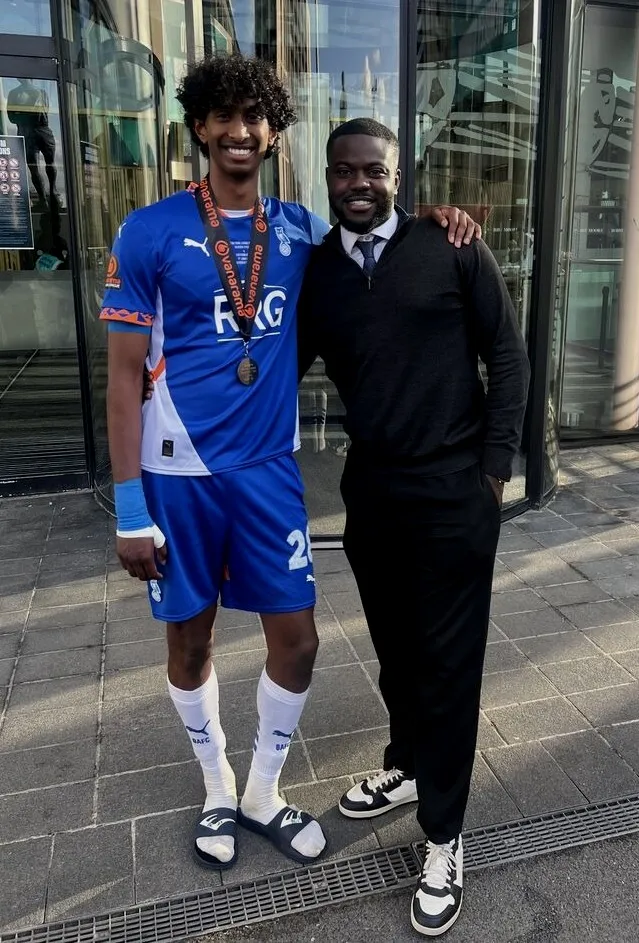
You’ve built strong rapport with your players, and football was once your dream too. Do you think being Black and from an ethnic minority helps you connect with your diverse clients, maybe even as a mentor or surrogate family?
Ohi:
I think I’m quite adaptable personally, so I’m able to build relationships with people from different countries and nationalities. But I definitely do think being a young person who’s played the game as well helps. Even though I don’t talk to players about the fact that I used to play, I just don’t mention it to these boys because I know they won’t believe it! But yeah, being a young man and being able to relate to the journey they’ve been on, I think it definitely helps build a stronger relationship. I’m very close with all my clients and their families, very, very close. I build strong relationships with them, and I think it just helps their families feel comfortable with me. Their families trust me and know that I’m working hard to push and promote their boys and girls. So it’s a healthy relationship, and I definitely think it does play a role.
I’m always saying this to players: they need to work with people who understand them and understand their background, understand where they come from, and actually want the best for them, as opposed to just wanting to do a deal. I know a lot of Nigerian players who are working with agents who don’t necessarily care about them or what’s best for them. I’m not going to call any names, but there was a player at the top of his game in the Premier League for a number of years, and he had an opportunity to sign for some of the biggest clubs in the league. However, his agent made him sign a five-year deal at his current club, which then killed him because he couldn’t move to the biggest clubs, the transfer fee his club was now requesting was too high. He’s had a good career, but he could have had an even better career if he worked with someone who just cared about him and didn’t just want to “collect a bag” to get paid. A good agent understands, ‘this guy has done so well to get here. Let’s do what’s best to get him to a top and even bigger club,’ as opposed to an agent just being like, ‘you know what? I don’t know how long this is going to last, let me just get paid a big fee, and whatever happens to him, so be it.’
It’s a cold game. Are there any more challenges that you think are unique to African players?
Ohi:
Definitely, I think with African players, it’s a difficult one, because I understand the background that the players come from. Obviously, I lived in Nigeria for 15+ years, so I understand what the country is like. I think a lot of African players are desperate to get out of Nigeria or Africa, so they just sign whatever, or sometimes even sign multiple agreements just to get out. I feel like players need to be more careful. The markets you go to determine where you end up. So in this window, for example, I’ve been trying to work on getting a player out of Eastern Europe and into England. He’s a very good player, scores goals, does well, but because of the markets he has played in, English clubs are not willing to bring him into the English market. So one thing I’ll say to African players: you need to be strategic. And yes, it is difficult, but every agreement you sign, every agent you work with, is going to affect you later down the line. So, as opposed to going with anything or anybody, I would advise that you, as much as possible, try to align yourself with someone who cares about you and is not just trying to use you to do a deal. For me, if I came across an African player, I’m thinking, ‘what’s the best route to get this player to the top?’ Not, ‘where can I get the biggest pay?’ I see agents taking players to all sorts of countries just for a big payday. That player is not going to be able to get back into the European market to thrive, and he might be a top player, and no one would ever know. His profile won’t grow, his career is not going to go in the right direction, because he made a decision to go into a market that does not align with the top European markets.
Especially with English clubs. I always advise young players, before you choose to move to Europe, establish yourself in England, especially if you’re from England, because the minute you go to Europe, if it doesn’t work out, coming back to England is really hard. You’re going to be sent to the lower leagues to prove yourself all over again. English clubs will rather go with players who have stayed in their system and been working hard in their system. So you need to be careful where you choose to move.
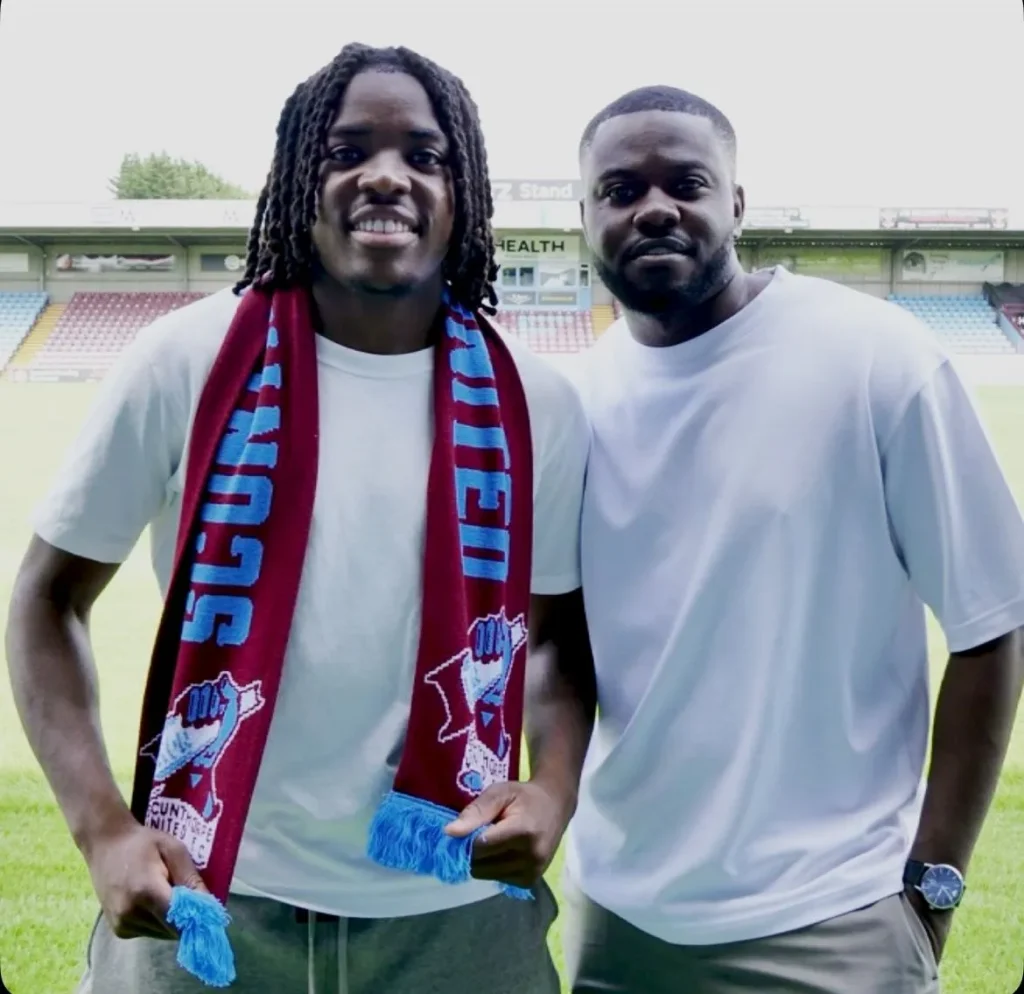
Do you have any advice for people who want to become agents. Would you do this again? Would you do it differently?
Ohi:
The past seven years have been an interesting journey. A piece of advice I’d give an upcoming agent is, honestly, to learn to be resilient. You NEED to be. You’re going to hear ‘No’ a million times, no joke, but you need to be able to keep going. I would advise young agents to focus on the talent. Focus on building relationships with families and players to then give you a chance of being able to approach a company to get a job. A lot of companies do not give start-up agents a job. It’s about what you can bring to the table. The question is always, ‘What players have you got?’ ‘What does your roster look like?’ So I would advise a young agent to start as soon as possible, start to build relationships with parents and families. When you’re talking to companies looking to hire within the field, you have to be able to say, ‘I work with this person, I work with that person. I have relationships with that person.’
You need to bring value always. What value are you bringing to the table?
Even as an intern, you need to be able to say, ‘I know this player. I know I have access to this player, I might be able to bring this player. Yes, he’s my family.’ It’s always: what value can you bring, and what kind of relationships do you have? That’s something if I knew I was going to go into this field, I would have started earlier, maybe as early as 16 or 17 when I was in and around football clubs. I would have been building relationships with other players, with the coaches. You don’t know where anyone’s going to end up. The first team coach at Yeovil Town was Nathan Jones, who’s now the manager at Charlton. If I knew I was going to be an agent at the time, I would’ve been building relationships with people in and around the game, because that’s where the real value is.
Looking back on your journey so far, what have been some of the real highlights and maybe some of the tougher moments , for you as an agent?
Ohi:
Viv Solomon-Otabor’s call-up to the Super Eagles against Brazil was definitely a big moment for me. Dubem Eze signing for Bolton felt really good as well. And then Vimal winning the play-off final at Wembley with Oldham, taking them back into the EFL, that was special. Those are the moments that really stand out, especially seeing the joy on family members’ faces. That’s when you really feel the impact of the work you’re doing. I’m sure there are still plenty more to come.
On the other side, the toughest moments have definitely been injury-related. Watching Saja Manafa struggle with injuries season after season at Everton, never quite getting that break, that’s been really hard. Other than that, I can’t think of too many real lows.
Do you have any players on your roster or not you think we should look out for?
Ohi:
I have a couple of players on my roster that I think have very bright futures. Maybe three or four years ago, I said, “Vimal Yoganathan, remember the name.” Yeah, I still think everyone should remember the name! Vimal is a top 19-year-old, he’s already playing in League One. He started the season playing the past two games in League One, and some of the biggest clubs in Europe have already started to inquire about him.
I have another client called Dubem Eze. He’s 20 years old, playing in the National League at the moment for Bolton. He’s another exciting talent on my roster who’s going to do really well. Jason Adigun is 21. He’s playing for Kidderminster at the moment, but I think he’s going to have a big future within the game. Abube Onuchukwu as well, he’s doing well. Those are my clients I think are going to do well.
There are one or two players I would mention that I think could have outstanding careers. There’s a boy called Damola Ajayi. He plays for Tottenham and was in and around the first team last season. He’s now on loan at Doncaster. He’s going to do really well, he’s an attacker, exciting. I’ll leave it there.
What is next for you? What do you see this? Where’s the end goal really?
Ohi:
At the moment, I have a football roster of eight clients. I work for a company called Tap 23. We have 15 football clients at the moment. I want to continue to build the roster, to sign and work with some of the best players in the world. I’m very confident in some of the young players I have on my roster. Some of them have started to kick on, are starting to play first-team football in League One, League Two, and the National League. I believe in the next 12 months, one or two of the boys are going to make substantial transfers to the Premier League or the Bundesliga.
I’m also trying to grow my roster and work with more Nigerian players. I think I have so much value to give Nigerian players. I’m a genuine guy that is looking to just work hard within the business and do what’s best for the player. I’m not sure if a lot of agents are doing that at the moment. So in the next three to five years, for me, it’s about continuing to grow the roster. I want to work with the best players in the world, with Premier League players, and continue to create opportunities for footballers and grow my profile within the game.
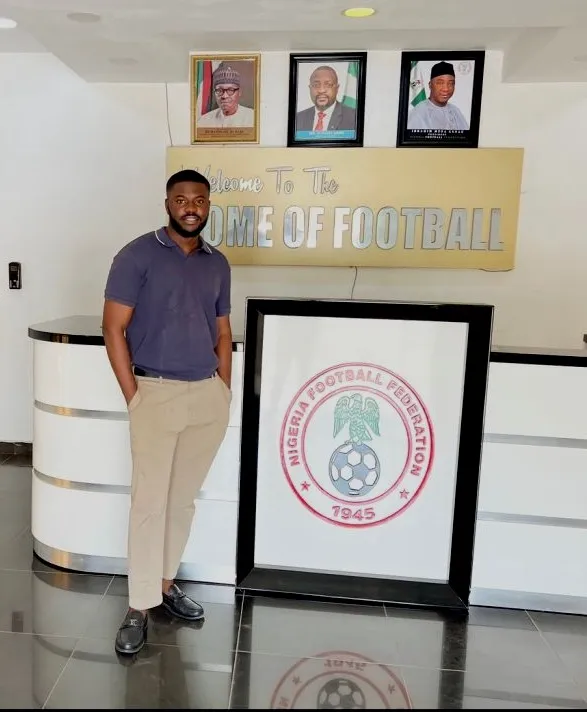
Seven years in for Ohi Longe, the work is far from finished. From the academy sidelines to contract signings, he’s built his career on relationships, persistence, and a genuine desire to see young talent thrive. In a sport obsessed with the top flight, he’s focused on the young players still climbing, the ones learning, growing, and navigating the challenges unique to them. For Ohi, it’s not about the glamour; it’s about making sure his players are supported, prepared, and ready when opportunity finally knocks.



